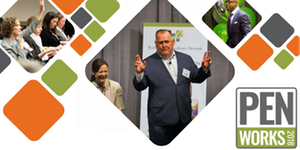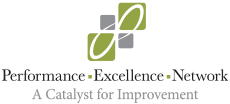
Excellence is a Choice: 44 Insights on Positivity, Optimism & Improvement – PEN June 2018
June 24, 2018
Quick show of hands: who is stressed? Maybe not right this second, but sometime the last few days or weeks? Any stress out there? I’m not sure anyone is actually raising their hand at their desks, but metaphorically, for those of you who didn’t, you’re probably lying because the data show we’re all pretty stressed these days.
As I referenced in my March 2018 article (The Power of Positivity: 15 Ways to Reduce Stress & Improve Optimism, Effectiveness), the American Psychological Association annual Stress in America survey indicates the US is at our highest stress level ever. Ever. Sources of the stress range from worry over politics and our nation to money to work to violence and crime. And that list doesn’t count the little things that we deal with every day – traffic congestion or inclement weather or low cell phone battery; the stresses of raising a family; or big stresses that some of us are dealing with, like the death of a loved one, divorce, moving, or job changes. We’re all getting worn thin, and it’s impacting our health, our careers, and our organizations.
Which is why PEN chose Posivity, Optimism, Excellence as the theme for our annual conference, PENworks 2018, which we hosted last month. In today’s stressful world, if ever there was a time to recharge, reinvent, and refocus, it is now! One of the things we learned at PENworks is we all have the ability to do it – managing stress, being positive, being optimistic, achieving excellence – they’re all choices. And they’re all the result of following systematic processes. It’s not touchy-feely stuff, but the result of deliberate, intentional action to produce a desired outcome.
William James, an American philosopher and psychologist, once said “The greatest weapon against stress is our ability to choose one thought over another.” He said that in 1890. Yes, EIGHTEEN 90 (before the onset of today’s stresses). In today’s challenging world, our ability as leaders and professionals to systematically stay positive can mean the difference between high performing teams and organizations and toxic ones.

The powerful two-day conference generated dozens of insights that can still inspire in the wake of the event itself. PENworks featured 32 local, regional, and national speakers, each sharing best practices and insights to improve organizational outcomes, leadership effectiveness, and professional positivity. Here are some of them – 44 insights that come from PENworks 2018 keynote speakers. I’m sure they represent only a small sample of the hundreds (or thousands) of insights shared at the conference, but these listed below apply to pretty much any and all organizations on the journey to excellence and any or all leaders/professionals who want to improve their own effectiveness. They have been used, tested and validated; they are great reminders for all of our organizations – and all of us as professionals – as we strive for ever-improving performance.
I encourage you to reflect on one or two a day. How does your organization (enterprise, department, division, project, or team) stack up? How can you improve your own professional performance? How can you and your organizations remain positive?
Brandon Johnson, The Positive Energy Guy (opening keynote)
- Energy is how you make people feel – and that can either be positive or negative.
- What you put out to the world tends to come back.
- Humility is in understanding that you are the problem. Accepting that enables you to be the solution.
- Success in life – and in business – is not just about execution, but about energy. People can duplicate your execution, but they can never duplicate your energy.
- Leaders: culture cannot be delegated.
- Being positive is a choice – it’s a deliberate lifestyle.
- Energy is everything.
- Positive energy, positive culture isn’t reflected in words, but in action.
- Maintaining positive energy is a process.
- Positive energy leads to positive relationships, which leads to trust. And a real team is one that trusts one another, not just works together.
Mike Browder, Bristol Tennessee Essential Services (2018 Baldrige Award recipient, Tennessee)
- As a small business, we have many informal processes, proving that you don’t have to be formal to be systematic and highly effective.
- The only way to consistently exceed customer expectations is to improve every day, because today’s better performance becomes tomorrow’s expectations.
- You can only exceed expectations on the same thing one time.
- You can’t be the best at everything – you need to focus.
- Biggest lessons on the journey to excellence: 1) don’t give up, 2) you’re not too small (or too large) to improve, and 3) focus on what’s important.i

Pat Logsdon, Stellar Solutions (2018 Baldrige Award recipient)
- You cannot achieve excellence without completely focusing on your customers.
- You don’t need a map if you don’t know where you are – know your organization’s strengths and gaps and have a vision for the future.
- To achieve excellence, be inquisitive: explore customer needs, focus on solving their problems.
- Excellence isn’t achieved overnight. Discover what’s working – your strengths – and build on them.
- Excellence requires integrating various tools into your management system.
- Excellence is all about customer focus.
Michael Gold, Jazz Impact (first day closing plenary keynote)
- Jazz and organizations are similar: both require managing change, improvisation, and a balance of structure and flexibility.
- It takes many individual parts in coordination to create an ensemble – in jazz and in organizations.
- Effective jazz, like with effective organizations, are all about relationships – coordination, integration, harmony, and balance.
- In jazz, you need to listen and respond to others – just like in organizations.
- Jazz is all about Ubuntu: being through the presence of others. In many ways, organizations are the same.
- Ubuntu: I am because you are – I can only be a person through others.
- Excellence is achieved through passion, and passion is established through practice. Passion is the fertilizer of optimism.
- A culture of innovation requires releasing ideas, taking risks – in jazz and in business.
- All progress involves taking risks.
- To work through ambiguity, minimize constraints, be flexible, take risks.
- Errors are the most significant opportunities for learning.

Jeff Mihelich, City of Ft. Collins, Colorado (2018 Baldrige Award recipient, Colorado)
- To reach excellence, you need BOTH a culture that inspires excellence and a strategy to get you there.
- In thinking about excellence, consider what you believe that no one else believes.
- Excellence requires all three factors: vision clarity, resource alignment, and effective systems and processes.
Barbara Sappah, Southcentral Foundation (2018 Baldrige Award recipient, Alaska)
- To achieve excellence, focus on your people.
- To engage with your customers, you need to really understand their needs. We are ALWAYS listening.
- Measuring performance isn’t useful unless you use it to take action and improve performance.
- The customers’ voice should be driving how you improve processes.

Terry Watson, Easify Inc. (closing keynote)
- When you have an error, it’s not the person but the process. Always.
- Never let perfect get in the way of better.
- I don’t care how good you are, anything can be improved.
- To truly achieve excellence, don’t just provide good customer service. Provide good customer value.
- Only have problem once! Learn; improve.

Minnesota Pollution Control Agency Commissioner John Stine, representing Governor Dayton in presenting the Performance Excellence Awards, said: “If you’re not learning, growing, and improving, you’re simply not.” In other words, you’re either getting better – as an organization, a leader, a contributor, a person – or you’re getting worse.
Staying positive takes hard work. Achieving and sustaining excellence – in our organizations and in ourselves – takes hard work. It takes a commitment of time, of resource, of energy. It takes focus, persistence, patience, and practice. As PENworks opening keynote Brandon Johnson said, it’s not about fluff and rah-rah. It’s about engagement, relationships, and commitment that will infuse your life and your organizations with positive energy and with positive results. It’s about people.
And it’s also about process. As I mentioned earlier, managing stress, being positive, being optimistic, achieving excellence – they’re all choices. And they’re all the result of following systematic processes. It’s not touchy-feely stuff, but the result of deliberate, intentional action to produce a desired outcome.
Whether you attended the PENworks 2018 conference or just read this article to this point, you now have some new tools, new ideas to improve your positivity and performance – I challenge you to try some on for the benefit of your teams, your organizations, and yourselves.
To download PENworks 2018 speaker slides, visit here.
And to download videos of the keynotes one at a time, visit here (or to download the bundle of all keynotes, visit here). Videos are $20 each viewing for members ($40 for non-members), or you can download all keynote talks for $100 for members ($200 for non-members). Attendees of the conference, email me for a code to waive all fees.
And we’ll see you at PENworks 2019: May 2-3 next year. Registration is open – visit here!
What comments do you have regarding positivity, optimism, and excellence? Participate in a discussion on this topic: visit our LinkedIn group to post a comment. And follow me on Twitter @LassiterBrian!
Yours in Performance Excellence,
Brian S. Lassiter
President, Performance Excellence Network
www.performanceexcellencenetwork.org
Catalyst for Success Since 1987!

